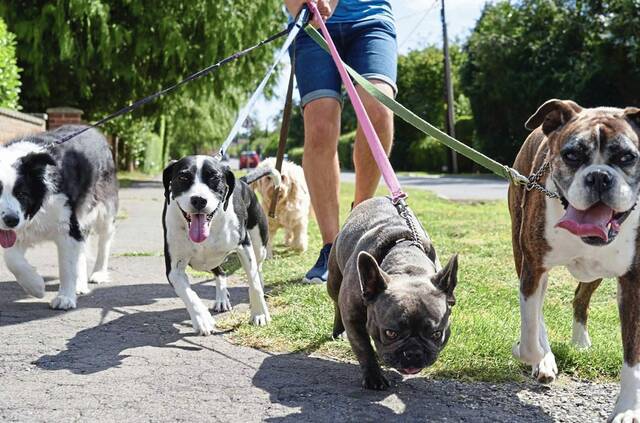https://development.triblive.com/local/regional/chickens-may-roost-but-dogs-cats-will-likely-be-unfazed-during-solar-eclipse/
Chickens may roost, but dogs, cats likely will be unfazed during solar eclipse

Unlike the excitement building among humans, Monday’s upcoming total solar eclipse isn’t likely to faze your dogs and cats, veterinarians say.
The Pittsburgh region will experience a partial solar eclipse, with 95% totality at the peak about 3:15 p.m. Those to the north in Erie will see a total solar eclipse.
For humans, doctors have emphasized the importance of using protective glasses or a pinhole box to view the eclipse in order to avoid eye injury. Animals, however, aren’t likely to be impacted because they do not normally look up at the sun.
“Generally, it’s not going to be a problem to have your pet outside,” said Dr. Stephanie Berger, veterinarian at Point Breeze Veterinary Clinic. “I think if you want to be extra safe and keep them inside to protect their eyes, that’s totally fine, but if your pet is outside, the chance that they are going to stare at the sun is pretty small, just because they don’t naturally do that.
“It’s not really a problem that we need to worry about. You don’t need to get eclipse glasses for your pet. If you’re concerned, just keep them inside.”
Related:• Don’t look at the solar eclipse without proper eye protection, doctors warn
Eclipse anxiety
Pets aren’t likely to be frightened by the eclipse, said Dr. Roman Lamberski, veterinarian at Pennsylvania Animal Wellness and Surgery in Hempfield.
“We’ve had partial eclipses in the past, and there was zero change in temperament or anxiety levels in my patients that I’ve seen,” he said. “I think they’d have more problems with fireworks and stuff like that then they would an eclipse.”
Berger agreed that, to her knowledge, previous eclipses haven’t spawned anxiety in most pets.
“If you think your pet might be anxious or if they’ve gotten anxious during previous eclipses, you can always talk to your vet about medication that might help with that anxiety, but I think the vast majority of pets are going to be completely unaffected and just fine,” she said.
Dr. Michelle Honse of River Valley Veterinary Hospital, which serves the Fox Chapel, Oakmont and Springdale areas, recommended that pet owners keep their animals indoors during the eclipse as an extra precaution. She emphasized staying calm during the event.
Panic can be contagious between pets and their owners, she said. A report from the American Kennel Club from a previous 2017 eclipse notes common signs of anxiety in dogs such as running and hiding, whining, panting, pacing, excessively barking, lip licking or yawning.
“Pets may become anxious if owners become anxious,” Honse said. “If their owners remain calm, pets will remain calm.”
Livestock under the sun
Dustin Heeter, livestock educator at the Westmoreland County Penn State Extension, said some farm animals may be affected by the eclipse, but he doesn’t expect to see huge changes in behavior.
Chickens and other birds may go to roost earlier when the skies become dark, he said.
“Anytime, as the sun goes down and nighttime comes on, animals are going to become a little bit more sedate,” he said. “If a person has chickens that are free ranging or outside, as evening comes and twilight kind of comes on, those birds naturally go to a spot where they roost, where they get up on something to sleep at night.”
Livestock are not likely to be harmed by the eclipse, he said.
“It’s truly not something that I think will cause anything for folks to worry about.”
If you happen to be in Ohio with your pet or around other animals during the eclipse, an initiative with the Ohio Division of Wildlife is encouraging people to note their observations of animals around them with the iNaturalist app.
Participants in Ohio can join the group “Ohio Wildlife Observations: Solar Eclipse 2024” to follow instructions and contribute to a database of information about how animals react to the eclipse.
Copyright ©2026— Trib Total Media, LLC (TribLIVE.com)
